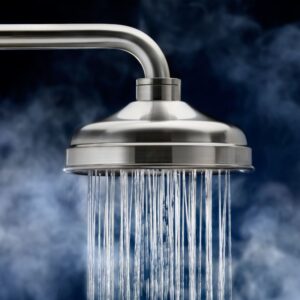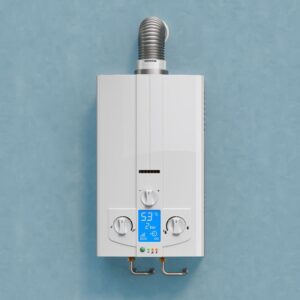When it comes to water heaters, there are many options to choose from, but gas and electric tankless water heaters are among the most popular. They are known for their energy efficiency, reliability, and durability. But how do you know which one is the best for you?
 How Are Tankless Water Heaters Powered?
How Are Tankless Water Heaters Powered?
When choosing a tankless system for your home, the first thing you need to consider is how your system will be powered.
Tankless systems can run off natural gas, propane, or electricity. All three power sources help a tankless water heater system to be an effective and energy efficient way to bring hot water into your home, but there are advantages and disadvantages to each source.
Gas/Propane Tankless Water Heaters: Pros & Cons
Gas tankless water heaters use natural gas or propane as fuel to heat the water as it flows through the unit. They tend to be more powerful than electric models, which means they can deliver hot water faster and in larger quantities.
Gas tankless water heaters are also more energy-efficient than gas storage tank models because they only heat the water when you need it, which means they don’t have to keep a large tank of water hot all the time. This can result in significant energy savings, especially if you have a large family or use a lot of hot water.
Advantages of Gas or Propane Tankless Water Heaters
- Can deliver hot water faster and in larger quantities than electric models
- More energy-efficient than storage tank models
- Lower energy bills due to energy efficiency
- More eco-friendly than traditional water heaters
- Lower operating costs than electric models
- Longer lifespan than storage tank models (around 20 years)
Disadvantages of Gas or Propane Tankless Water Heaters
- Higher upfront cost than storage tank models and electric tankless models
- Requires professional installation and ventilation
- Limited placement options because they require ventilation and hook-ups to a gas source
- Can be affected by power outages
- Produces greenhouse gases during combustion
Electric Tankless Water Heaters: Pros & Cons
Electric tankless water heaters use electricity to heat the water as it flows through the unit. They are often smaller and less powerful than gas models, which means they may not be able to deliver hot water as quickly or in large quantities.
However, they are still more energy-efficient than storage electric tank models because they only heat the water when you need it. As with a gas tankless system, electric tankless water heaters can provide significant energy savings compared to traditional options.
Advantages of Electric Tankless Water Heaters
- More compact and space-saving than gas models
- More energy-efficient than storage tank models
- Lower upfront cost than gas models
- More placement options since they do not require ventilation or a gas line
- No greenhouse gas emissions
Disadvantages of Electric Tankless Water Heaters
- May not deliver hot water as quickly or in as large of quantities as gas models
- Higher operating costs than gas models
- Limited water output, making them not suitable for larger households with high water use
- Shorter lifespan than gas models (around 10 -15 years)
- Can be affected by power outages
What To Consider When Choosing a Tankless Water Heater
 If you are planning to replace your old water heater or install a new one as part of a new build, you might be wondering which type of water heater is best for your family. In the past, most households had traditional storage tank water heaters, but these days tankless water heaters are becoming increasingly popular due to their energy efficiency and convenience.
If you are planning to replace your old water heater or install a new one as part of a new build, you might be wondering which type of water heater is best for your family. In the past, most households had traditional storage tank water heaters, but these days tankless water heaters are becoming increasingly popular due to their energy efficiency and convenience.
Tankless water heaters not only are more energy efficient, they are also much smaller and compact compared to their traditional tank system counterparts. This means that homeowners have more flexibility and choice in where they choose to install a tankless system and the added benefit of not losing precious space in your home to another appliance.
We’re Here to Help
When it comes to choosing between gas and electric tankless water heaters, there are several factors to consider, including your household size, hot water usage, budget, and location. Gas tankless water heaters are often a better option for colder climates, larger households, or households with high hot water usage because they can deliver hot water faster and in larger quantities. They are also more energy-efficient and have a longer lifespan than electric models.
That said, if your household is smaller, or you live in a warmer climate, an electric tankless water heater may be more cost-effective on the front end than a gas tankless water heater.
Have questions? Call the professionals at Winston’s today to discuss which option is best for your household needs. Dial 703-379-5006 or reach out online now.
